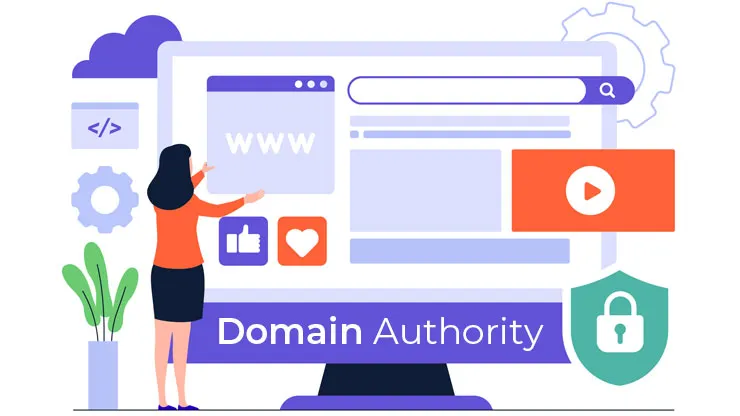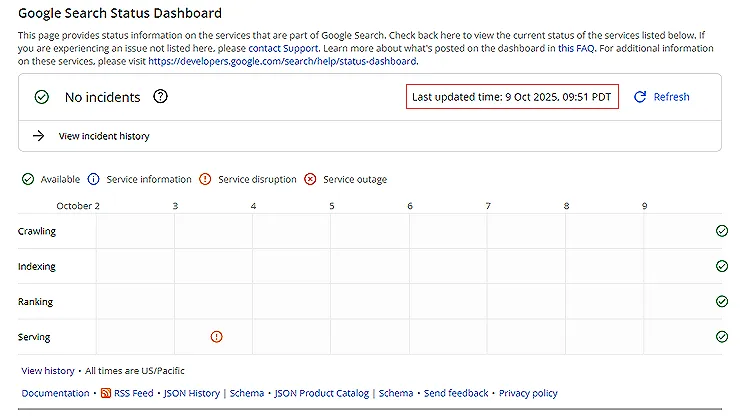Understanding Domain Authority: Definition and Significance
Domain Authority (DA) is a metric developed to provide a comparative analysis of the potential power of a website’s domain name in search engine results. At its core, Domain Authority is a predictive measure, gauging the likelihood of a website ranking on search engine results pages (SERPs). Originally conceptualized by Moz, DA is calculated based on multiple factors including the total number of links, the quality of these links, and other significant elements that influence a website’s ability to rank. While the DA score ranges from 1 to 100, with higher scores reflecting a greater ability to rank, it is pivotal to acknowledge that Domain Authority is not a metric used by search engines in ranking websites. Instead, it is an industry-standard tool, utilized by digital marketers and SEO professionals to understand a website’s search engine ranking potential relative to competitors.
What Is Domain Authority and How Is It Calculated?
Domain Authority (DA) is an intricate score that predicts the performance of a website in search engine rankings. Initiated by Moz, the DA score integrates data from Moz’s Link Explorer web index, aggregating metrics such as linking root domains and the total number of links into a single DA score. This approach enables the DA calculation to reflect the competitiveness of a particular website on SERPs. The calculation also involves a machine learning model that identifies the algorithm that best correlates with rankings across thousands of search results, which Moz uses to predict the ranking potential of a site. It’s essential to note, however, that because DA is comparative, it does not provide a direct measure of a site’s search engine ranking ability but rather a relative measure of its strength against competitor websites. Furthermore, since Google does not use DA in its algorithm, fluctuations in a website’s DA score are indicative of its relative ranking potential over time and are not directly correlated with Google search rankings. Achieving a higher DA score requires improving its composite factors, such as enhancing the link profile by increasing the number of high-quality inbound links.
Evaluating Domain Authority: What Is Considered Good?
When it comes to evaluating Domain Authority (DA), understanding what constitutes a “good” DA score is vital for digital marketers, SEO professionals, and website owners aiming to enhance their site’s online visibility. It is important to consider DA in the context of an industry-specific benchmark rather than an absolute value. Typically, a DA score can be segmented into ranges: a score between 1 and 30 is generally seen as low, indicating a nascent or less established website; scores between 31 and 50 are considered average, reflecting a degree of reliability and some authoritative presence; scores from 51 to 70 suggest a strong competitive position within the market, with significant authority and link equity; and finally, scores above 70 are deemed excellent, representing highly authoritative sites that dominate search engine results pages (SERPs) and have extensive link profiles.
However, it’s crucial to assess DA comparatively rather than in isolation. The value of a “good” DA score varies among different industries and competitive landscapes. For instance, in a highly competitive sector like finance or health, a relatively high DA might be necessary to stand out, whereas in niche markets, a lower score might still enable a site to achieve top SERP positions. Additionally, improvements in DA should be viewed as a long-term goal, focusing on building a robust link profile and enhancing overall site quality rather than seeking quick fixes. Remember, DA is a valuable tool for gauging relative ranking potential and monitoring your site’s progress over time, not an end-goal metric for SEO success.
DA as a PageRank replacement PageRank is a numerical score Google’s algorithm assigned to websites, based on the quality and quantity of its inbound links. PageRank numbers used to be publicly available, but Google later stopped updating them, and ultimately stopped showing them altogether. The PageRank number was a signal Google used to rank websites. In fact, they still use it in their internal calculations even though it isn’t publicly available. PageRank is just one among many ranking signals, but numbers are tangible and objective, unlike many other ranking signals like “high quality content.” This is why many people craved a replacement after PageRank became unavailable. While DA is a helpful guess at how a site will perform in search, it is not a direct replacement for PageRank, as it is not a ranking signal and is not used by Google in their ranking calculations.
The Importance of Striving for Higher Domain Authority
The quest for a higher Domain Authority (DA) score transcends mere numbers; it embodies the pursuit of building a more reputable, authoritative, and ultimately, more visible website on the internet. A higher DA is indicative of a website’s robust link architecture and content value, both of which are pivotal in securing a commendable ranking on Search Engine Results Pages (SERPs). From a practical standpoint, websites with higher DA scores tend to attract more organic traffic, foster greater trust among users, and enjoy better conversion rates. This enhanced online presence is vital for businesses, especially small businesses and nonprofits working with limited marketing budgets, as it levels the playing field against larger competitors.
Moreover, investing efforts into increasing a website’s DA can have long-term benefits. It not only improves a site’s competitive edge in its niche but also augments the overall quality of the website. This entails creating valuable content, engaging in ethical SEO practices, and fostering meaningful connections through high-quality inbound links. Each of these strategies not only contributes to a higher DA but also to a more enriching user experience, which is the cornerstone of online success in today’s digital landscape.
For companies like INTELLIPLANS, which are dedicated to helping small businesses and nonprofits enhance their online presence, emphasizing the importance of striving for a higher DA is part of a holistic approach to digital solutions. A higher Domain Authority signals to search engines and users alike that a website is a credible and valuable resource. Therefore, it’s a critical component of any effective SEO and online marketing strategy, facilitating growth and ensuring sustained online visibility in an increasingly competitive digital space.
Decoding DA: Insights into Domain Authority Metrics
Understanding the matrix behind Domain Authority (DA) score is essential for effectively navigating the complexities of SEO. Moz’s DA is constructed around a 100-point logarithmic scale. This means that climbing from a DA of 20 to 30 is significantly easier than progressing from 70 to 80. The metrics involved in calculating DA include the number and quality of inbound links, the strength of the linking root domains, and machine-learning predictions on how well a website will perform in SERPs based on these factors.
Furthermore, Moz occasionally updates its algorithm to refine how DA is calculated, which can lead to shifts in DA scores. These updates aim to ensure the DA score more accurately reflects the current search landscape, acknowledging the evolving algorithms of search engines like Google. It’s important for businesses and SEO professionals to stay informed about these updates, as a sudden change in DA could reflect an algorithm update rather than a drop in site quality or search performance.
Another key aspect of DA metrics includes spam score and subdomain metrics, factors that can also influence a site’s DA. For instance, sites with a high spam score may be penalized in their DA, highlighting the importance of maintaining a clean, reputable link profile. In understanding these nuances, businesses, especially those focused on growth and visibility like those supported by INTELLIPLANS, can more effectively strategize on improving their site’s DA. This deep dive into DA’s metrics underscores its value not as a direct ranking signal for search engines, but as a comprehensive indicator of website health, competitive stature, and the potential to rank well for targeted keywords in SERPs.
Achieving a Higher Domain Authority: Steps and Strategies
Improving a website’s Domain Authority (DA) is a strategic process that requires a consistent and multifaceted approach. Since DA is a composite metric that reflects the strength and quality of a website’s link profile, enhancing it involves a number of targeted actions aimed at building the site’s overall credibility and visibility in search results. Here are several key steps and strategies that can effectively contribute to achieving a higher DA:
- Content Creation: High-quality, relevant content is foundational for attracting inbound links from reputable sites. By consistently publishing valuable information that serves the needs of your audience, you’re more likely to be cited as a reference or recommended as a resource, which can lead to natural link building.
- Link Building: Actively seeking opportunities to gain high-quality inbound links is crucial. This can involve guest blogging, partnership, or collaboration with other credible sites in your niche. The focus should always be on acquiring links from domains with a high DA score themselves, as these are weighted more favorably in the calculation.
- Internal Linking: Developing a robust internal linking strategy helps distribute page authority throughout your site, making it more navigable for users and search engines alike. Strategic internal linking can enhance user experience, keep users engaged longer, and help improve your site’s SEO profile.
- Eliminating Bad Links: Periodically auditing your link profile to identify and remove or disavow low-quality or spammy links is important for maintaining a healthy DA. Tools like Moz’s Link Explorer can be instrumental in identifying potentially harmful links to your site’s standing.
- Improving Site Structure and Usability: Search engines favor websites that provide a good user experience. This includes fast loading times, mobile friendliness, and intuitive navigation. Optimizing these aspects can indirectly contribute to a higher DA by making your site more favorable to both users and search engines.
- Social Media Engagement: While social signals are not a direct factor in DA calculations, active engagement on social media can help increase the visibility of your content and the likelihood of it being linked to. This indirect effect can contribute to a higher DA over time.
INTELLIPLANS is committed to helping small businesses and nonprofits in boosting their online presence, these SEO strategies form a core part of their advice and services. Implementing these steps can significantly impact a website’s Domain Authority, leading to improved search engine rankings, higher traffic, and, ultimately, greater online success. Achieving a high DA is an ongoing process that rewards consistency, quality, and strategic planning.










